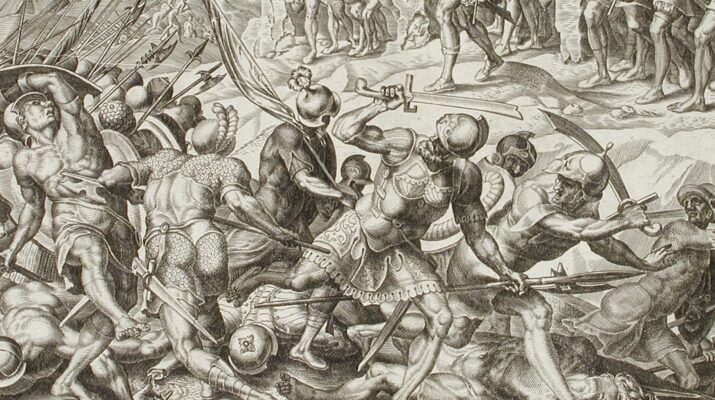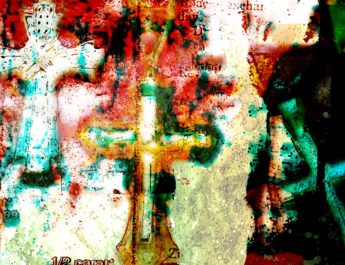Judges 12
1 The menI of EphraimII were called to arms,III and they crossedIV
I “men” = ish. Perhaps from enosh (human, humankind, mortal); from anash (to be weak, sick, or frail). This is man, husband, another, or humankind.
II “Ephraim” = Ephrayim. From the same as epher (ashes or dust – properly something strewn) OR from parah (to grow, increase, be fruitful in a literal or figurative sense). This is Ephraim, one of Joseph’s sons, his descendants, and their land.
III “called to arms” = tsaaq. This is to cry out or call together, to shriek. It can mean, by implication, calling for an assembly.
IV “crossed” = abar. This is to pass over or cross over. It is used for transitions, whether literal or figurative. It can also mean to escape, alienate, or fail. This is the root verb from which “Hebrew” is drawn.
to ZaphonV and saidVI to Jephthah,VII
V “Zaphon” = Tsaphon. From tsaphan (to hide, hoard, reserve; to cover over or figuratively to deny; also to lurk). This is properly hidden, dark, or gloomy. It can also be used to refer to the north.
VI “said” = amar. This is to speak, say, answer, command, promise, report.
VII “Jephthah” = Yiphtach. From pathach (to open wide in a literal or figurative sense; to open, draw out, let something go free, break forth, to plow, engrave, or carve). This is Jephthah or Iphthah, meaning “he opens.” It is a name and a city.
“WhyVIII did you cross over to fightIX against the AmmonitesX
VIII “why” = maddua. From mah (what, how long) + yada (to know, be aware, see and so understand – includes observation, care, recognition; can also be used as a euphemism). This is why or how.
IX “fight” = lacham. This is to eat or feed on. Figuratively, it is to battle as a kind of consumption/destruction.
X “Ammonites” = ben + Ammon. Literally, “children of Ammon.” Ben is from banah (to build or obtain children). This is son, age, child. It is son in a literal or figurative sense. Ammon is from im (with, against, before, beside); {perhaps from amam (to darken, hide, associate; creating shadows by huddling together)} OR from am (people, folk, nation; also troops or attendants; used figuratively for a flock); {from amam (see above)}. This is Ammon or Ammonites, a tribe whose name may mean “tribal.”
and did not callXI us to goXII with you? We will burn your houseXIII downXIV over you!”
XI “call” = qara. This is to call or call out – to call someone by name. Also used more broadly for calling forth.
XII “go” = halak. This is go, come, walk. It is walk literally and figuratively and includes people and animals. It can be used figuratively for one’s moral life – how we walk according to God’s way or against it. It can also refer to the walk of life as in the course one’s life takes, the choices we make, etc.
XIII “house” = bayit. Related to “Ammonites” in v1. Probably from banah (see note X above). This is house, court, family, palace, temple.
XIV “burn…down” = saraph…esh. Saraph is to burn or kindle. This is the root that “seraphim” comes from. Esh is fire, burning, flaming, hot. It is fire in a literal or figurative sense.
2 Jephthah said to them,XV “My peopleXVI and I were engaged inXVII conflictXVIII
XV {untranslated} = ish. Same as “men” in v1. See note I above.
XVI “people” = am. Related to “Ammonites” in v1. See note X above.
XVII “were engaged in” = hayah. This is to be or become, to happen.
XVIII “conflict” = rib. From rib (properly to toss or grapple; used figuratively to mean wrangling and so for arguments, complaints, or disputes; used in a legal setting for pleading or defending a case). This is strife or dispute – whether a personal one or one in a court of law.
with the Ammonites who oppressed us severely.XIX But when I calledXX you, you did not deliverXXI me from their hand.XXII
XIX “severely” = meod. Perhaps from the same as uwd (firebrand, a poker). This is very, greatly, exceedingly. It can also mean vehemence, force, abundance.
XX “called” = zaaq. This is to cry or call out. It can be a call to assemble or gather together. By analogy, this could refer to a herald who announces a public gathering. It could also be a shriek from pain or danger.
XXI “deliver” = yasha. To deliver, defend, help, preserve, rescue, be safe. Properly, to be open, wide or free, which implies being safe. Used causatively, it means to free.
XXII “hand” = yad. This is hand, ability, power. Hand in a literal sense, but also what one can do or the means by which one does it.
3 When I sawXXIII that you would notXXIV deliver me, I tookXXV my lifeXXVI in my handXXVII and crossed over against the Ammonites,
XXIII “saw” = raah. This is to see in a literal or figurative sense so stare, advise, think, view.
XXIV “not” = ayin. Perhaps from a word that means to be nothing. This means nothing, none, non-existent. It can also simply mean not or are not.
XXV “took” = sim. This is to put or place in a literal or figurative sense. It can be appoint, care, change, make, and may other things.
XXVI “life” = nephesh. Related to naphash (to refresh or be refreshed). This is soul, self, person, emotion. It is a breathing creature. Can also refer to appetites and desires.
XXVII “hand” = kaph. From kaphaph (to bend – from a root meaning curve or bend down). This is palm of the hand or sole of the foot, footstep, grasp. Figuratively, it can also mean power.
and the LordXXVIII gaveXXIX them into my hand.XXX Why then have you come upXXXI to me this day,XXXII to fight against me?”
XXVIII “Lord” = YHVH. Related to “were engaged in” in v2. From havah (to be, become) or hayah (see note XVII above). This is the name of the God of Israel, the self-existent and eternal one, the tetragrammaton. This pronunciation has been lost to time so “Lord” is generally used in its place.
XXIX “gave” = natan. This is to give, put, set, offer. It is to give literally or figuratively.
XXX “hand” = yad. Same as “hand” in v2. See note XXII above.
XXXI “come up” = alah. This is to go up, approach, ascend, be high, be a priority; to arise in a literal or figurative sense.
XXXII “day” = yom. Root may mean being hot. This is the day in a literal or figurative sense. It can also mean birth, age, daylight, continually or other references to time.
4 Then Jephthah gatheredXXXIII allXXXIV the men of GileadXXXV and fought with Ephraim,
XXXIII “gathered” = qabats. This is to collect, assemble, heap, grasp, or gather.
XXXIV “all” = kol. From kalal (to complete). This is all or every.
XXXV “Gilead” = Gilad. From gala (to lay bare, quarrel, expose) OR from gal’ed (heap of testimony); {from gal (wave, billow, rock pile; something rolled; a spring of water); {from galal (to roll, roll away, wallow, commit, remove; rolling in a literal or figurative sense)} + ed (witness, testimony, recorder); from ud (to admonish, repeat, duplicate, testify, restore, record, relieve)}}. This is Gilead, meaning “perpetual fountain” or “heap of testimony.” See https://www.abarim-publications.com/Meaning/Gilead.html#.Xw_EFShKhPY.
and the men of Gilead defeatedXXXVI Ephraim, because they said, “You are fugitivesXXXVII from Ephraim, you Gileadites,XXXVIII in the heart ofXXXIX Ephraim andXL Manasseh.”XLI
XXXVI “defeated” = nakah. This is to hit whether lightly or severely. It can be used in a literal or figurative sense. So, this could be beat, punish, give wounds, kill, or slaughter.
XXXVII “fugitives” = palit. From palat (to escape, slip out, deliver, calve). This is escaped, i.e. one who has gotten away such as a fugitive or refugee.
XXXVIII “Gileadites” = Gilad. Same as “Gilead” in v4. See note XXXV above.
XXXIX “in the heart of” = tavek. This is among, middle, in the midst, the center. Perhaps, properly, to sever.
XL {untranslated} = tavek. Same as “in the heart of” in v4. See note XXXIX above.
XLI “Manasseh” = Menashsheh. From nashah (to forget, neglect, remove, deprive). This is Manasseh, literally “causing to forget.” It is Manasseh, his tribe, or the lands of the tribe.
5 Then the Gileadites tookXLII the fordsXLIII of the JordanXLIV against the Ephraimites.XLV XLVIWhenever one of the fugitives of Ephraim said, “Let me go over,”XLVII
XLII “took” = lakad. This is to capture, seize, or imprison. It is to catch something in a snare or net or trap. It can also mean to occupy of select something by casting lots.
XLIII “fords” = ma’abar. Related to “crossed” in v1. 11x in OT. From abar (se note IV above). This is a ford or place to cross, whether a river or mountain pass. It can also be transit.
XLIV “Jordan” = Yarden. From yarad (to go down, descend; going down in a literal or figurative sense; going to the shore or a boundary, bringing down an enemy). This is the Jordan River, meaning “descending.”
XLV “Ephraimites” = Ephrayim. Same as “Ephraim” in v1. See note II above.
XLVI {untranslated} = hayah. Same as “were engaged in” in v2. See note XVII above.
XLVII “go over” = abar. Same as “crossed” in v1. See note IV above.
the menXLVIII of Gilead would say to him, “Are you an Ephraimite?”XLIX
When he said, “No,”
6 they said to him, “ThenL say Shibboleth,”LI
XLVIII “men” = enosh. Related to “men” in v1. See note I above.
XLIX “Ephraimite” = Ephrathi. Related to “Ephraim” in v1. 5x in OT.
L “then” = na. This particle is used for requests or for urging. It can be we pray, now, I ask you, oh. This is the same “na” in “hosanna.”
LI “Shibboleth” = shibbol. 19x in OT. From the same as shobel (the train of a skirt that flows after a woman). This is an ear of grain or corn, a branch, a stream or flood.
and he said, “Sibboleth,”LII for he couldLIII not pronounceLIV it right.LV
LII “Sibboleth” = sibboleth. Related to “Shibboleth” in v6. 1x in OT. From sabal (to carry a heavy load, do strong labor, be a burden; specially, to be pregnant) OR from shibbol (see note LI above). This is shibboleth, which may mean ear of grain.
LIII “could” = kun. Properly, this means in a perpendicular position. So, it is set up in a literal sense – establish, fix, fasten, prepare. In a figurative sense, it is certainty, to be firm, faithfulness, render sure or prosperous.
LIV “pronounce” = dabar. This is generally to speak, answer, declare, or command. It might mean to arrange and so to speak in a figurative sense as arranging words.
LV “right” = ken. Related to “could” in v6. Perhaps from kun (see note LIII above). This is to set upright. Generally used figuratively to mean thus, so, afterwards, rightly so.
Then they seizedLVI him and killedLVII him at the fords of the Jordan. FortyLVIII-twoLIX thousandLX
LVI “seized” = achaz. This is to grasp, catch, seize, take and hold in possession. It can also be to be afraid or hold back.
LVII “killed” = shachat. This is to slaughter, slay, or beat. It can be slaying for a sacrifice or in a massacre.
LVIII “forty” = arbaim. From the same as arba (four); from raba (to make square or be four-sided); perhaps from raba (to lie down flat; can be to lie for mating). This is forty.
LIX “two” = shenayim. From sheni (double, again, another, second); from shanah (to fold, repeat, double, alter, or disguise). This is two, both, second, couple.
LX “thousand” = eleph. Perhaps from the same as eleph (herd, cattle); from alaph (to learn, speak, associate with). This is thousand.
of the EphraimitesLXI fellLXII at that time.LXIII
LXI “Ephraimites” = Ephrayim. Same as “Ephraim” in v1. See note II above.
LXII “fell” = naphal. This is to fall, whether by accident, to fall prostrate, or to fall in violent death. Figuratively, it can refer to personal ruin or calamity, a city falling, an attack or a falling away. It can also be a deep sleep or wasting away.
LXIII “time” = et. Probably from anah (to answer, sing, announce); from ad (forever, all, old); from adah (to pass on, advance, decorate oneself). This is a period or season. It can also mean whenever or continually.
7 Jephthah judgedLXIV IsraelLXV sixLXVI years.LXVII
LXIV “judged” = shaphat. This is to judge, defend, pronounce judgment, condemn, or govern. It can refer to God judging or to human judges. This is pronouncing a verdict in favor or against so it implies consequences or punishment. It can also mean to litigate or govern as one with authority.
LXV “Israel” = Yisrael. From sarah (to persist, exert oneself, contend, persevere, wrestle, prevail) + El (God or god). This is Israel, meaning God strives or one who strives with God; new name for Jacob and for his offspring. This refers to the people and to the land.
LXVI “six” = shesh. This is six. Figuratively, it can be a surplus since it is one more than the number of fingers on the hand.
LXVII “years” = shanah. From shana (to change, alter). This is a year, age, old. It can also mean yearly.
Then Jephthah the GileaditeLXVIII diedLXIX and was buriedLXX in his townLXXI in Gilead.
LXVIII “Gileadite” = Giladi. Related to “Gilead” in v4. 11x in OT. From Gilad (see note XXXV above). This is a Gileadite, someone descended from Gilead or who lives in Gilead. See https://www.abarim-publications.com/Meaning/Gilead.html#.Xw_EFShKhPY.
LXIX “died” = mut. This is to die in a literal or figurative sense. It can also refer to being a dead body.
LXX “buried” = qabar. This is to bury or inter. It could also refer to the person who does the burying.
LXXI “town” = iyr. From uwr (to awaken or wake oneself up). This can mean excitement in the sense of wakefulness or city. Properly, this is a place that is guarded. Guards kept schedules according to watches. This sense of the word would include cities as well as encampments or posts that were guarded.
8 AfterLXXII him IbzanLXXIII of BethlehemLXXIV judged Israel.
LXXII “after” = achar. From achar (to remain behind, linger, continue, be behind, or delay; can also imply procrastination). This is after or the last part, following.
LXXIII “Ibzan” = Ibtsan. 2x in OT. From the same as Ebets (Ebez, perhaps meaning conspicuous) OR from the same as ababuah (boils, sores). This is Ibzan, which may mean “splendid” or “illustrious.” See https://en.wikipedia.org/wiki/Ibzan
LXXIV “Bethlehem” = Beth lechem. Related to “Ammonites” and “house” in v1 & to “fight” in v1. From bayit (see note XIII above) + lechem (bread, food, loaf; food for people or for animals); {from lacham (see note IX above)}. This is Bethlehem, meaning “house of bread.”
9 He hadLXXV thirtyLXXVI sons.LXXVII He gave his thirty daughtersLXXVIII in marriageLXXIX outside his clanLXXX
LXXV “had” = hayah. Same as “were engaged in” in v2. See note XVII above.
LXXVI “thirty” = sheloshim. From the same as shalosh (three, fork, triad). This is thirty or thirtieth.
LXXVII “sons” = ben. Same as “Ammonites” in v1. See note X above.
LXXVIII “daughters” = bat. Related to “Ammonites” and “house” in v1 & “Bethlehem” in v8. From ben (see note X above). This is daughter in a literal or figurative sense.
LXXIX “gave…in marriage” = shalach. This is to send out, away, send for, forsake. It can also mean to divorce or set a slave free.
LXXX “outside…clan” = chuts. Root may mean to sever. So, this is something that is separated by a wall – the outside, the street, a field, highway, or abroad.
and brought inLXXXI thirty young womenLXXXII from outside for his sons. He judged Israel sevenLXXXIII years. 10 Then Ibzan died and was buried at Bethlehem.
LXXXI “brought in” = bo. This is to enter, come in, advance, fulfill, bring offerings, enter to worship, attack. It can also have a sexual connotation.
LXXXII “young women” = bat. Same as “daughters” in v9. See note LXXVIII above.
LXXXIII “seven” = sheba. This is seven or by sevenfold. It can also be used to imply a week or an indefinite number. Symbolically, this is the number of fullness, sacredness, perfection.
11 After him ElonLXXXIV the ZebuluniteLXXXV judged Israel, and he judged Israel tenLXXXVI years.
LXXXIV “Elon” = Elon. 6x in OT. From ayil (oaks); from the same as ulam (porch, hall); from the same as ul (mighty, strength, body, belly; root may mean to twist and that implies strength and power) OR from alam (to bind or tie fast; to be silent or speechless, whether voluntary or involuntary). This is Elon, a terebinth or oak. It is a personal name of several people in the Bible.
LXXXV “Zebulunite” = Zebuloni. 3x in OT. From Zebulun (Zebulun, that tribe or their territory; means “habitation”); from zabal (to dwell, inclose, reside). This is Someone descended from Zebulun.
LXXXVI “ten” = eser. Perhaps from asar (to tithe, render a tenth of). This is ten or -teen. While 7 is symbolically the number of perfection, ten is also symbolically a number of perfection (but to a lesser degree than 7 is).
12 Then ElonLXXXVII the Zebulunite died and was buried at AijalonLXXXVIII in the landLXXXIX of Zebulun.XC
LXXXVII “Elon” = Elon. Related to “Elon” in v11. 10x in OT. From ayil (see note LXXXIV above). This is terebinth, oak, or another kind of tree that is strong.
LXXXVIII “Aijalon” = Ayyalon. Related to “Elon” in v11 & “Elon” in v12. 10x in OT. From ayyal (deer, stag); {from the same as ulam (see note LXXXIV above). This is Aijalon, several cities whose name means “deer” or “place or gazelles” or “deer-field” or “protruding one.” See https://www.abarim-publications.com/Meaning/Aijalon.html
LXXXIX “land” = erets. Root may mean to be firm. This is earth, ground, field land, or country.
XC “Zebulun” = Zebulun. Related to “Zebulunite” in v11. See note LXXXV above.
13 After him AbdonXCI son of HillelXCII the PirathoniteXCIII judged Israel.
XCI “Abdon” = Abdon. 8x in OT. From abad (to work, serve, compel; any kind of work; used causatively, can mean to enslave or keep in bondage). This is Abdon, a personal and city name that means “servitude” or “place of work” or “working one” or “hard slavery.” See https://www.abarim-publications.com/Meaning/Abdon.html
XCII “Hillel” = Hillel. 2x in OT. From halal (to praise, be boastful). This is Hillel, a name that means “he has praised” or “praise” or “praising.” See https://www.abarim-publications.com/Meaning/Hillel.html
XCIII “Pirathonite” = Pirathoni. 5x in OT. From Pirathon (Pirathon; “height” or “chieftaincy”); from the same as pera (leader, revenge, lengthy hair); from pera (hair, unkempt hair); from para (to avenge, avoid, loosen, expose, begin). This is Pirathonite, someone from Pirathon, which man mean “place of the little pharaoh” or “town of the confederation” or “height” or “just revenge.” See https://www.abarim-publications.com/Meaning/Pirathon.html
14 He had forty sons and thirty grandsonsXCIV who rodeXCV on seventyXCVI donkeys;XCVII he judged Israel eightXCVIII years.
XCIV “grandsons” = ben + ben. Literally, “sons of sons.” Same as “Ammonites” in v1. See note X above.
XCV “rode” = rakab. This is to ride an animal or in some vehicle. It can also mean bringing on a horse.
XCVI “seventy” = shibim. Related to “seven” in v9. From sheba (see note LXXXIII above). This is seventy.
XCVII “donkeys” = ayir. Related to “town” in v7. 9x in OT. Perhaps from ur (see note LXXI above). This is a male donkey or a colt as an animal of labor who is newly domesticated to bear loads.
XCVIII “eight” = shemoneh. Perhaps from shamen (to shine, which implies being oily, growing fat); from shaman (to grow fat, shine, be oily). This is eight or eighth. It can refer to abundance as being more than 7, the number of sacred fullness.
15 Then Abdon son of Hillel the Pirathonite died and was buried at PirathonXCIX in the land of Ephraim, in the hill countryC of the Amalekites.CI
XCIX “Pirathon” = Pirathon. Related to “Pirathonite” in v13. 1x in OT. See note XCIII above.
C “hill country” = har. From harar (hill or mountain). This is mountain, hill, hilly region.
CI “Amalekites” = Amaleqi. 12x in OT. From Amaleq (Amalek or Amalekites; the person and their descendants); perhaps from amal (to work – hard labor) OR from am (people or nation; a tribe, troops or armies, or figuratively to refer to a flock of animals); {from amam (to darken, hide, associate; creating shadows by huddling together)} + laqaq (to lap, lick) OR from am (see above) + malaq (to wring, nip; to remove a bird’s head). This is Amalekite, perhaps meaning “people that wring,” “people that lap,” “nippers,” or “lickers.” See https://www.abarim-publications.com/Meaning/Amalekite.html & https://www.abarim-publications.com/Meaning/Amalek.html
Image credit: “Gideon Destroying the Army of the Midianites” by Maerten van Heemskerck, 1561.




